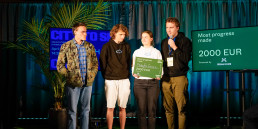The 48-hour international hackathon “City to Sea” took place from April 22 to 24 in Riga. 117 participants from 18 countries were competing for the main prizes. After 121 meetings with mentors and the idea evaluation process by an international jury, in total six teams behind the best business ideas for aquaculture and mobility challenges received 18 000 euros.
“The participants of the hackathon confirmed that we are capable of creating market oriented and competitive ideas in a relatively short time. In total, 21 teams developed their ideas during the hackathon. All of them will have the opportunity to continue working on the development of their ideas after the event. It is a good start for moving towards the goal of the mission “Sea 2030” – address issues regarding climate change, clean mobility pollution and the circular economy by offering innovative solutions for the clean water cycle,” points out one of the members of the hackathon jury, and the director of the Latvian Investment and Development Agency (LIAA) Kaspars Rožkalns.
For the Water track, 11 teams developed their ideas during the hackathon. In the nomination “The most advanced solution”, 3500 euros were awarded to team “P-Agro”, which develops an affordable technology that recovers phosphorus (P) from wastewater. With the support from the EIT Food in the nomination “The highest growth potential” 3500 euros were awarded to the team “SUBmerge”, which develops a submarine that can detect pollution and collect data from different depths and locations. Meanwhile, the nomination “The biggest progress made” and 2000 euros received a team “N-LAB / Wise River” for developing unmanned water vehicle.
For the Mobility track, 10 teams were looking for solutions to challenges put forth by Riga City Council. With the support from Riga City Council in the nomination “The biggest progress in hackathon” 2000 euros went to the “Pray for Green ” solution, which aims to reduce insurance costs for companies and decrease the ‘sick days’ by incentivizing employees to shift active mobility. In the nomination “Biggest growth potential”, 3500 euros were awarded to team “Dumb 2 Smart lights”, which retrofits street lanterns into smart city hubs enabling electric car and scooter charging options, IoT sensors, 5G antenna placement, and other solutions. The nomination “The most advanced solution” and 3,500 euros from LIAA went to “4city”, which offers a robust four-wheel electric scooter with improved balance, as well as an integrated box for storing belongings in the electric scooter.
The hackathon participants had the opportunity to use “Copernicus Marine Service” satellite data, which helps to assess the state of the Baltic Sea and develop solutions to improve the situation.
The City to Sea hackathon was organized by the LIAA, bringing together government, private, and research organizations. The event was organized by Riga Technical University (RTU) and the innovation movement “VEFRESH” with the support of the European Institute of Innovation and Technology (EIT) innovation community “EIT Food” and “EIT Urban Mobility”, Lithuanian digital innovation hub “AgriFood Lithuania DIH”. The cooperation partners of the hackathon are the Freeport of Riga Authority, Riga City Council, “Accenture”, “Latvijas Mobilais telefons”, the Scientific Institute for Food Safety, Animal Health and the Environment “BIOR”, the Latvian Maritime Academy, and the Latvian Institute of Hydroecology. The implementation of the hackathon was supported by the ERDF and the Norwegian Financial Mechanism.
The City to Sea hackathon is part of the mission Sea 2030. The mission’s core objective is to address issues regarding climate change, pollution, and the circular economy by creating an environment conducive to the creation of innovative projects and sustainability.

